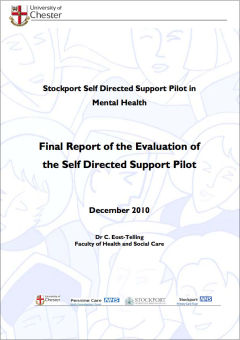The University of Chester's evaluation of self-directed support for people with mental health problems in Stockport.
The University of Chester's report on the use of self-directed support in mental health services is one of the most detailed and helpful accounts of how personalisation is working in practice.

Personalisation is and will continue to be a key policy strand of support in adult social care for the foreseeable future. This report outlines one of the few medium scale, (n=179), studies focusing on mental health self-directed support, (SDS), to date. This evaluation focussed an innovative pilot in mental health using a full resource allocation system (RAS).
Our findings showed service user’s evaluated their experiences positively, reporting the process of SDS contributed to building capacity in all areas of the keys citizenship, (Duffy 2010). Users reported an increase in hope, confidence and motivation and personal budgets moved people towards recovery as the following indicates:
Plans have enabled them to reconnect with their communities, build self-esteem self-image and hope for the future and ultimately supported them to move towards recovery. (Eost-Telling p15)
There were of course problems and challenges identified. The services need to find ways of integrating user-led and community resources into their thinking as peer groups did not perceive their input as valid or as a key component of support. Co-production remains a key area of work with service systems; asymmetrical relationships between professionals and service users persist, this must change. Similarly practitioners should be worked with, not against. Service systems need to provide clarity and simplicity avoiding duplication. Practitioners were found to be open to innovation and change; however there was a need to recognise that not all current practice or certainly the values underpinning this practice is wrong.
As people moved towards recovery and took on more responsibility for their own support, their relationship with traditional services will change. User’s networks of support may expand and change to incorporate communities and others who can provide more naturalistic support. Services currently do not have mechanisms to facilitate progression outside of their remit. Work is being developed to address this as the evaluation calls more involvement with community and peer led organisations in developing support with individuals as they journey towards recovery.
As we set off there was lots of emphasis on the systems and structures. We soon learnt that the major issue was to change the culture. The teams involved were already doing some fantastic work but often this project brought their thinking to a new level. Self-directed support is now part of what we do. It's been hard work for everyone involved; but we know that it was the right decision to move forward in this way. Enabling people with mental health problems to have the same opportunities as others - to direct their own support
My experiences in Stockport were exciting and challenging. The outcomes for people with mental ill health have been irrefutable. Working independently meant that I could truly stand between people and services to create the tension that was so important to make the changes that meant people could have true choice and control. I will remember for a long time sitting in one persons front room as they explained what decorating their flat would mean for them. They intuitively knew what it would take move their own life on.
The publisher is the University of Chester.
Final Report of the Evaluation of the Self-Directed Support Pilot © Charlotte Eost-Telling 2010.
All Rights Reserved. No part of this paper may be reproduced in any form without permission from the publisher except for the quotation of brief passages in reviews.
mental health, Self-Directed Support, Paper